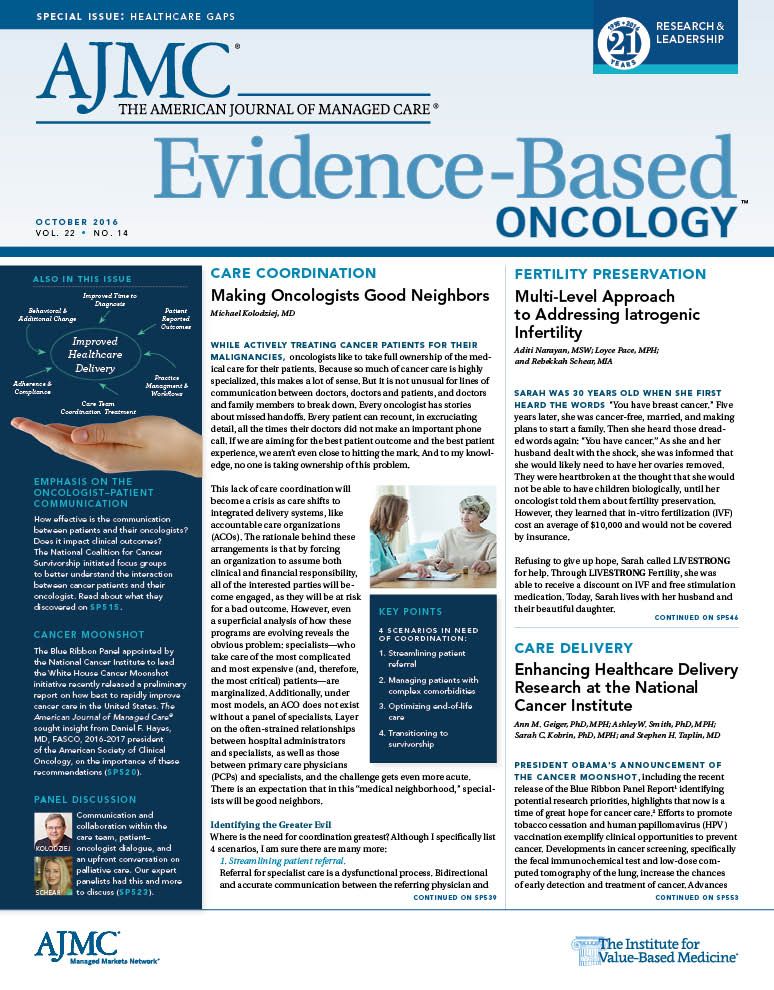- Center on Health Equity & Access
- Clinical
- Health Care Cost
- Health Care Delivery
- Insurance
- Policy
- Technology
- Value-Based Care
A New Biomarker Predicts Response to Pembrolizumab in Advanced Melanoma
A new study by researchers at the Perelman School of Medicine at the University of Pennsylvania has identified a biomarker that can predict response to treatment with pembrolizumab in stage IV patients with melanoma.
Predictive biomarkers—those that can ascertain the success of a treatment—can be very useful in deciding early on if a patient should continue on a treatment plan. Now, a new study by researchers at the Perelman School of Medicine at the University of Pennsylvania has identified such a biomarker in stage IV patients with melanoma being treated with the immunotherapy pembrolizumab (Keytruda).
In their study presented at the CRICIMT- EATI-AACR International Cancer Immunotherapy Conference: Translating Science into Survival, the authors found that the ratio of a subset of immune cells in the blood to the tumor burden correlated with clinical response. “We set out to investigate whether we could monitor and predict a patient’s response to pembrolizumab by tracking the effect of pembrolizumab on immune cells in blood samples from the patients,” said lead author Alexander Huang, MD, clinical fellow in the Division of Hematology/ Oncology and Institute for Immunology at Perelman.
The researchers monitored 29 patients with advanced stage IV melanoma by analyzing immune cells in their blood that was collected before and at 3, 6, 9, and 12 weeks after initiating treatment with pembrolizumab. The authors were primarily interested in following the proliferation of exhausted phenotype CD8+ T cells, which have high levels of programmed death ligand-1 (PD-L1) on their cell surface. These cells are so named because they are no longer capable of inhibiting tumor cells. Pembrolizumab can reinvigorate exhausted phenotype CD8+ T cells, which can be measured by their proliferative capacity.
The authors identified increased proliferation of exhausted phenotype CD8+ T cells in 78% of patients, post treatment. When they calculated the ratio of exhausted phenotype CD8+ T cell reinvigoration to pretreatment tumor burden, a correlation with clinical response was noted. Using this calculation, a clinical response was observed in 38% patients. In one cohort, half the patients with a clinical response exceeding 1.94 were alive at 11-months post treatment with pembrolizumab. In another cohort, 75% of patients with a ratio greater than 1.94 were alive a 2-years post treatment. “We were excited to find that patients with a balance in favor of the immune response compared to tumor burden were more likely to have clinical benefit,” Huang said, adding that their findings need validation in a larger study.Reference
Ratio of certain immune cells to tumor burden correlated with outcome for pembrolizumab-treated patients with melanoma [press release]. New York, NY: American Association for Cancer Research; September 26, 2016. http://www.aacr.org/Newsroom/Pages/News-Release-Detail.aspx?ItemID=939#.V-qy9_krLIX. Accessed September 26, 2016.

HEDIS Glycemic Goal Achieved Using Control-IQ Technology
December 22nd 2025A greater proportion of patients with type 1 diabetes who used automated insulin delivery systems vs multiple daily injections achieved the Healthcare Effectiveness Data and Information Set (HEDIS) glycemic measure.
Read More
Linking Data to Determine Risk for 30-Day Readmissions in Dementia
December 22nd 2025This study found that certain characteristics in linked electronic health record data across episodes of care can help identify patients with Alzheimer disease and related dementias at high risk of 30-day readmissions.
Read More
Performance of 2-Stage Health-Related Social Needs Screening Using Area-Level Measures
December 19th 2025Limiting health-related social needs screening to lower-income areas would reduce screening burdens; however, this study found a 2-stage screening approach based on geography to be suboptimal.
Read More
Impact of Medicaid Institution for Mental Diseases Exclusion on Serious Mental Illness Outcomes
December 17th 2025Medicaid’s Institution for Mental Diseases (IMD) rule bars federal funding for psychiatric facilities with more than 16 beds, but findings indicate that state waivers allowing treatment of serious mental illness in IMDs do not increase overall psychiatric hospitalizations.
Read More

